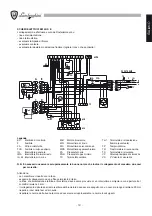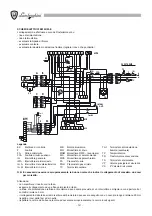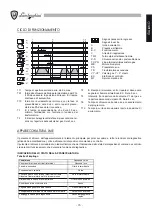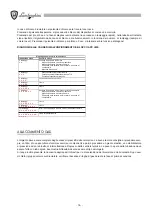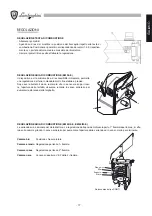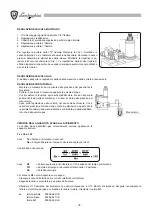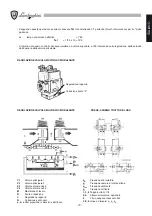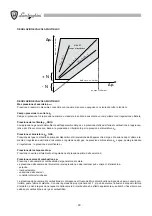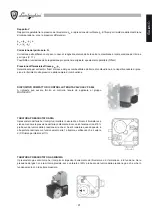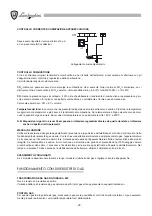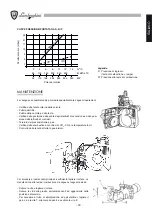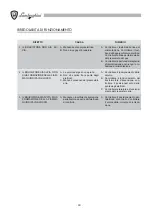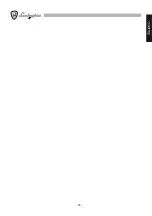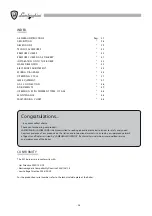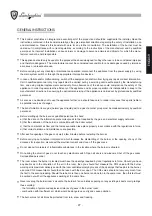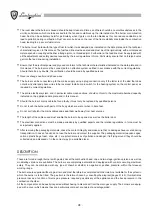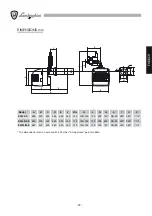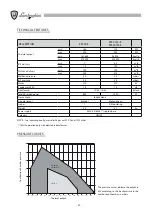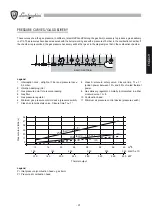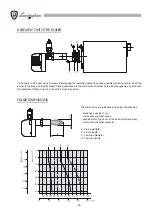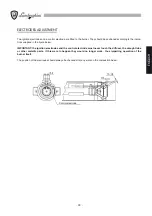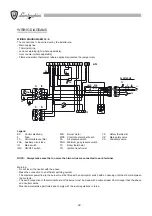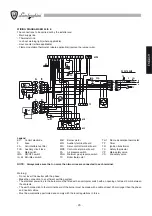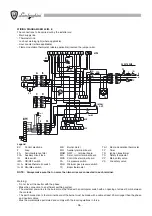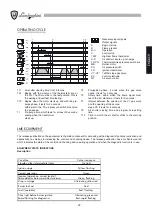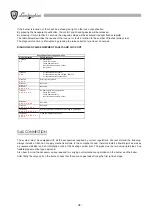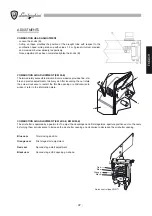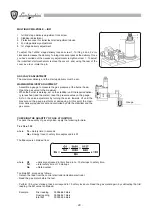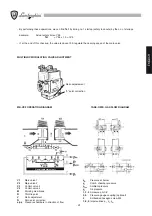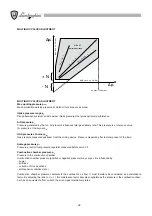
- 27
-
ENGLISH
GENERAL INSTRUCTIONS
•
This booklet constitutes an integral and essential part of the product and should be supplied to the installer. Read the
instructions contained in this booklet carefully as they give important directions regarding the safety of installation, use
and maintenance. Preserve this booklet with care for any further consultation. The installation of the burner must be
carried out in compliance with current regulations, according to the instructions of the manufacturer and by qualified
personnel. An incorrect installation can cause injury or damage to persons, animals and objects, for which the manu-
facturer cannot be held responsible.
•
This appliance should only be used for the purpose it has been designed for. Any other use is to be considered improper
and therefore dangerous. The manufacturer cannot be considered responsible for any damages caused by improper,
erroneous or unreasonable use.
•
Before carrying out any cleaning or maintenance operation, disconnect the appliance from the power supply, by using
the main system switch or through the appropriate interception devices.
•
In case of failure and/or malfunctioning, switch off the equipment and refrain from trying any repair or direct intervention.
Call in qualified personnel only. Any repair must be carried out by a servicing centre authorised by the manufacturing
firm, one using original replacements exclusively. Non-observance of the above could compromise the safety of the
appliance. In order to guarantee the efficiency of the appliance and its proper operation it is indispensible to keep to the
manufacturer’s directions, by ensuring the periodical servicing of the appliance is carried out by professionally qualified
personnel.
•
As soon as one decides not to use the appliance further, one should take care to render innocuous those parts liable to
be potential sources of danger.
•
The transformation from a gas (natural gas or liquid gas) to a gas of another group must be made exclusively by qualified
personnel.
•
Before starting up the burner ask qualified personnel to check:
a) that the data on the information plate corresponds to that required by the gas, and electrical supply networks;
b) that the calibration of the burner is compatible with the boiler output;
c)
that the comburent air flow and the fumes evacuation take place properly in accordance with the regulations in force.
d) that correct aeration and maintenance are possible.
•
After each reopening of the gas cock wait a few minutes before restarting the burner.
•
Before carrying out whatever intervention which foresees the dismantling of the burner or the opening of any of the
accesses for inspection, disconnect the electrical current and close off the gas cocks.
•
Do not deposit containers of inflammable substances in the location where the burner is situated.
•
On noticing the smell of gas do not touch any electrical switch. Open all doors and windows. Shut off the gas cocks.
Call qualified personnel.
•
The room where the burner is located must have the openings required by local regulations in force. Should you have
any doubts as to the circulation of the air in the room, then you should first measure the CO2 value with the burner
working at its maximum delivery and with the room ventilated solely by means of the openings that feed air to the burner;
a second CO2 measurment should then be taken with the door open. The CO2 value should not vary very much from
the first to the second reading. Should there be more than one burner and one fan in the same room, then this test must
be carried out with all the appliances working at the same time.
•
Never cover up the burner room’s air vents, the burner’s fan’s air-intake openings or any existing air ducts or air gratings,
thus avoiding:
- the formation of poisonous/explosive mixtures of gases in the burner room;
- combustion with insufficient air, which would be dangerous, costly and cause pollution.
•
The burner must at all times be protected from rain, snow and freezing.
Summary of Contents for EM 40/2-E
Page 2: ......
Page 25: ...25 ITALIANO...
Page 47: ...47 ENGLISH...
Page 69: ...69 FRAN AIS...
Page 91: ...91 DEUTSCH...
Page 113: ...113 ESPA OL...
Page 115: ...115 a b c d CO2 CO2 CO2...
Page 116: ...116 119 133...
Page 120: ...120 2 n 4 3 4 5 1 A B C D...
Page 121: ...121 2...
Page 126: ...126 3 sec 3 sec LME 10...
Page 127: ...127 B 1 2 3 B H EM 35 E H H EM 40 2 E EM 40 M E H fi 1 max E E 1 E 2 E VE 2 2 14 10 13 SQN 71...
Page 132: ...132 3 A CO2 CO2 CO2 8 5 10 11 12 B P CO CO CO 0 1 160 C 220 C TPR TS B P...
Page 134: ...134 1 A B A B 2 A B C A B C 3 A A...
Page 135: ......

